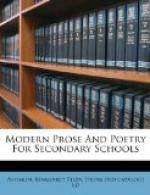“Boys, Quite So was hurt last night,” he said, with a white tremor to his lip.
“What!”
“Shot on picket.”
“Why, he was in the pit next to mine,” cried Strong.
“Badly hurt?”
“Badly hurt.”
I knew he was; I need not have asked the question. He never meant to go back to New England!
* * * * *
Bladburn was lying on the stretcher in the hospital-tent. The surgeon had knelt down by him, and was carefully cutting away the bosom of his blouse. The Latin grammar, stained and torn, slipped, and fell to the floor. Bladburn gave me a quick glance. I picked up the book, and as I placed it in his hand, the icy fingers closed softly over mine. He was sinking fast. In a few minutes the surgeon finished his examination. When he rose to his feet there were tears on the weather-beaten cheeks. He was a rough outside, but a tender heart.
“My poor lad,” he blurted out, “it’s no use. If you’ve anything to say, say it now, for you’ve nearly done with this world.”
Then Bladburn lifted his eyes slowly to the surgeon, and the old smile flitted over his face as he murmured,—
“Quite so.”
NOTES
=the first battle of Bull Run=:—Fought July 21, 1861; known in the South as Manassas.
=Long Bridge=:—A bridge over which the Union soldiers crossed in fleeing to Washington after the battle of Bull Run.
=Shenandoah=:—A river and a valley in Virginia—the scene of many events in the Civil War.
=Fairfax Court House=:—Near Manassas Junction.
=On to Richmond=:—In 1861 the newspapers of the North were violently demanding an attack on Richmond.
=Faneuil Hall=:—An historic hall in Boston, in which important meetings were held before the Revolution.
=McDowell=:—Irving McDowell, who commanded the Union troops at Bull Run.
=McClellan=:—George B. McClellan, commander of the Army of the Potomac.
=Wandering Jew=:—A legendary person said to have been condemned to wander over the earth, undying, till the Day of Judgment. The legend is probably founded on a passage in the Bible—John 21:20-23.
=folding its tents=:—A quotation from The Day is Done, by Longfellow. The lines are:—
And the night shall be filled
with music,
And the cares,
that infest the day,
Shall fold their tents, like
the Arabs,
And as silently
steal away.
=Big Bethel=:—The Union troops were defeated here on June 10, 1861.
=Ball’s Bluff=:—A place on the Potomac where the Union soldiers were beaten, October 21, 1861.
=Centreville=:—A small town, the Union base in the first Battle of Bull Run.
=Lewinsville=:—A small town, north of Centreville.
=Vienna=:—A village in the Bull Run district.




